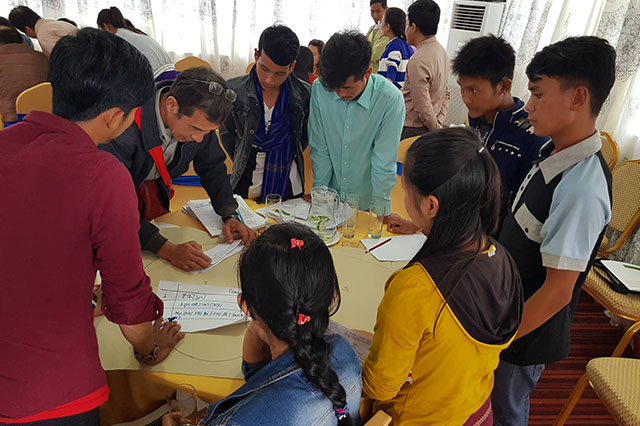Strengthening Public Understanding Of Environmental Impact Assessment

MCRB recently worked with Vermont Law School (supported by Heinrich Boll Stiftung), in cooperation with the Environmental Conservation Department (ECD) of MONREC, and local civil society networks, to hold workshops in Mandalay (30 November – with Green Justice Institute), Monywa (7 December – with MATA Sagaing National Coordination Unit), Taunggyi (14 December – with Mong Pan Youth Organisation) and Loikaw (20-21 December – with Eden Development Network).
These workshops, each of which was for approximately 40 participants, were targeted primarily at local civil society organisations and human rights defenders with an interest in environmental issues and corporate accountability. There were also government participants from ECD, and in some of the workshops, officials from the Directorate of Investment and Companies Administration (DICA), Mining Enterprises, Ministry of Hotels and Tourism, as well as Members of Sagaing Regional Hluttaw at the Monywa workshop.
Presentations in all workshops included a discussion of the EIA process and public participation requirements, and the need for and value of companies to have operational grievance mechanisms (a local example of an OGM from Myanmar company MPRL was described). MCRB introduced participants to concepts of responsible business, creating shared value and the multiple understandings of ‘CSR’ (corporate social responsibility) in Myanmar. The Loikaw workshop also included presentations on social impacts, and stakeholder engagement and mapping, and highlighted key findings concerning impacts of mining and tourism investment, from MCRB’s sector-wide impact assessments (SWIA).
In view of the importance of hydropower projects in Kayah State, MCRB also presented in Loikaw on the recently completed Strategic Environment Assessment (SEA) of Hydropower in Myanmar by the IFC/World Bank. Vicky Bowman explained the distinction between an SEA and an EIA, and the implications for potential hydropower projects in Kayah State of the SEA’s recommendations. This includes the proposed Ywathit dam on the Thanlwin river, which the SEA recommended should not proceed, as part of the SEA’S advice to avoid damming Myanmar’s significant mainstem rivers.
Interactive activities at the workshop in Loikaw included MCRB’s ‘CSR game’, distinguishing between a company’s obligations, its ability to create shared value on a voluntary basis, and philanthropic activity; and a task to take on the role of EIA consultant and map stakeholders/rightsholders, and their potential interests for two fictitious projects (a hotel in the 7 Lakes region in Dimawhso, and a Chinese tin min in Mawchi).
Participants were also asked to score Myanmar companies out of 10 for different aspects of responsible business conduct. The average score was 4.05/10; the highest score (4.71) was for treating customers responsibly and the lowest (3.14) for paying bribes and tea money.
Similar workshops were held by MCRB together with Metta Development Foundation and Environmental Conservation and Farmer Development Organization (Shan) in Kengtung and Taunggyi in October. In 2019, MCRB plans further work with Metta/ECFD in Lashio and Myitkyina, as well as further collaboration with Vermont Law School on EIA awareness raising elsewhere in Myanmar, with the support of the US State Department.
အထက်ပါအကြောင်းအရာနှင့်ပတ်သတ်၍ ဆက်လက်ဖတ်ရှုလိုပါက
- ပတ်၀န်းကျင်ထိခိုက်မှုဆန်းစစ်ခြင်း (EIA) သည် ရင်းနှီးမြှုပ်နှံသူများက ဆိုးကျိုးသက်ရောက်မှုများကို ဖြေရှင်းရန်အတွက် သေချာစွာလုပ်ဆောင်ထားသည့် ဆန်းစစ်မှုဖြစ်သင့်သည်။ သို့သော် ၎င်းဆန်းစစ်မှုသည် ရပ်ရွာဖွံ့ဖြိုးရေးကို မြှင့်တင်ရန်အတွက် နည်းစနစ်ကောင်း တစ်ခုတော့မဟုတ်ပါ။
- MCRB comments on the draft registration procedure for ‘3rd party’ EIA consultants
- Workshop for Kyaukphyu communities on EIA and public participation
- Civil Society Organisations Stress the Need for More Information in the EIA Process
 English
English မြန်မာ
မြန်မာ မြန်မာ (unicode)
မြန်မာ (unicode)








